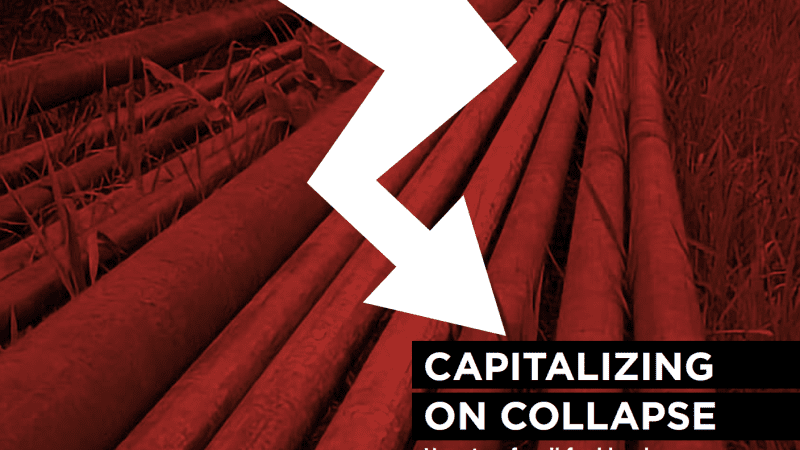Stand.earth reacts to 2024 federal budget: Some nurture, not enough nature
April 16, 2024
OTTAWA (TRADITIONAL, UNCEDED TERRITORY OF THE ALGONQUIN ANISHNAABEG PEOPLE) — As people across Canada brace for another season of worsening forest fires, droughts, and floods, the federal government has tabled a budget that seeks to make life more affordable, but misses an opportunity to cut handouts to big polluters and prioritize real climate solutions, Stand.earth said today.
Some measures in Budget 2024 are a step in the right direction and signal that the government knows voters, especially younger people, want to see strong action on climate and the environment. Restored funding for home energy efficiency retrofits is a welcome inclusion along with tax credits to scale up wind and solar electricity. But continuing to support the massively profitable fossil fuel industry and giving tax breaks to other polluting energy sectors like forest biomass will further delay Canada’s clean energy transition – resulting in bigger and bigger price tags to respond to climate change-caused disasters like droughts, wildfires, and floods.
“As we head into what will likely be another horrific wildfire season, people across the country know that acting later is too late to avert climate catastrophe. They want to see this government prioritize real solutions that protect the planet and their futures now, while making life more affordable,” said Liz McDowell, Senior Campaigns Director at Stand.earth. “Today’s budget missed a huge opportunity to redirect billions in subsidies and tax breaks from polluting oil, gas, and forest biomass companies – and the financial institutions that enable them – to build greener homes and prioritize real solutions like solar, wind and energy efficiency.”
While planning to reach net zero GHG emissions by 2050 is a commendable aspiration, fossil fuel subsidies cost every individual taxpayer $214 every year, while big oil and gas companies get lavish tax breaks and government giveaways. Ending fossil fuel subsidies for an industry which made $45 billion last year could help ease the affordability crisis.
“Temperatures are going to keep rising as long as the government continues to give Canadians’ money to the heavy polluters who are causing the climate crisis,” said Sven Biggs, Stand.earth’s Canadian Oil and Gas Program Director. “New reporting shows that the Government of Canada provided at least $18.5 billion in financial support to big oil companies in 2023 alone, including $8 billion in new loan guarantees for the Trans Mountain pipeline, which has cost taxpayers $35 billion to date. Even more disappointing are the reports that Minister Freeland backed down on a windfall tax on oil and gas profits in the face of heavy-handed industry lobbying.”
The budget includes a new Housing Plan which commits substantial funding for constructing new homes as well as $900 million in funding for home retrofits and home energy labeling.
“We are glad to see that funding for home retrofits has been largely renewed and earmarked for direct installation for low to median income earners, which will help with the vital transition from polluting gas heating to efficient and affordable heat pumps, said Lana Goldberg, SAFE Cities Climate Campaigner for Stand.earth. “That said, it’s disappointing that this budget doesn’t require publicly-funded new construction to meet modern green building standards and that ‘21st century’ homebuilding innovation funds don’t include basics like electric heating. As the federal government gears up to help build nearly four million new homes, it’s important to build them right the first time – low-carbon and affordable.”
Despite Finance Minister Chrystia Freeland previously committing to key climate finance regulations, today’s budget failed to make progress. The government must better regulate banks, and phase-out investments in the fossil fuel sector.
“It’s deeply disappointing that Minister Freeland failed to include the bare minimum next steps on climate financial regulation, including tangibly advancing the establishment of a green taxonomy and mandating climate risk disclosure from Canadian corporations,” said Richard Brooks, Climate Finance Director with Stand.earth. “Financial institutions, especially banks like RBC, are raking in record profits while exacerbating the climate crisis through billions in fossil fuel financing, and can’t be trusted to do the right thing on their own. We were hoping our government would embrace its responsibility and step in to regulate banks into taking real climate action.”
Like the Fall Economic Statement released in November 2023, Budget 2024 outlines plans to make burning biomass part of the government’s clean energy strategy – an alarming proposition given clear evidence that the industry is logging primary forests in Canada to produce wood pellets, and the devastating impacts the global forest biomass industry has had around the world.
“Climate experts have repeatedly warned this government that forest biomass is a dirty fuel that emits as much pollution as coal at the smokestack, but officials seem more interested in adopting industry spin than facing the facts,” said Richard Robertson, Forest Campaigner at Stand.earth. “Forests are best left standing to capture and store carbon, rather than burning them for electricity and funding unproven technologies as proposed in the federal budget. This industry is taking whole logs and residues that degrade primary forests and it should not receive tax breaks meant for clean energy.”
Spending on climate emergencies will only continue to grow in future budgets if the core causes of climate change go unaddressed, putting our collective future at risk.
###
Media contacts
In Ottawa:
For comment on The Canada Green Buildings Strategy and building electrification – Lana Goldberg, Climate Campaigner, lana.goldberg@stand.earth
In Toronto:
For comment on bank and financial institution regulations, and on fossil fuel funding – Richard Brooks, Climate Finance Director, richard@stand.earth
In Vancouver:
For comment on oil, LNG, electrification and renewable energy – Sven Biggs, Oil and Gas Programs Director, sven@stand.earth
For comment on forest fires and industrial logging – Liz McDowell, Senior Campaigns Director, liz@stand.earth
For comment on forest biomass energy generation – Richard Robertson, Forest Campaigner, richard.robertson@stand.earth
For assistance with arranging interviews, please contact Stand.earth’s Canada Communications Specialists:
Kathryn Semogas – kathryn.semogas@stand.earth (EDT)
Arin de Hoog – arin.dehoog@stand.earth (CEST)



